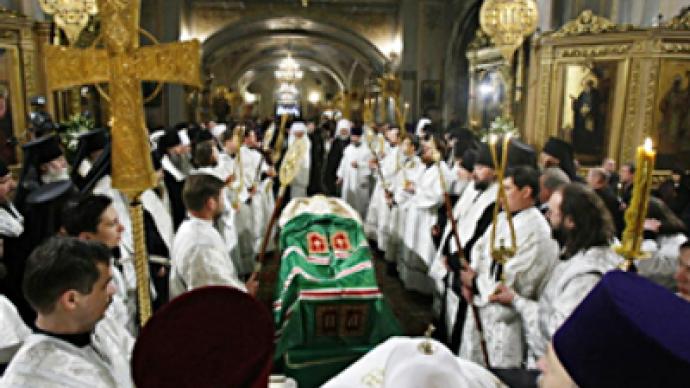Requiem services held for Patriarch

Requiem services for Patriarch Alexy II are being conducted in Orthodox churches all across Russia and overseas on Jan. 13.
According to the Orthodox Church tradition, a human soul comes to God’s interim judgment on the fortieth day after death to have her lot decided on before the final judgment. There is a custom to intensify prayers for the deceased on this particular day.
Alexy II was born Alexei Ridiger on February 23, 1929, in Tallinn, Estonia, where his religious parents took refuge from the Bolshevik regime established after the 1917 Revolution. Alexy’s father was a priest. His grandfather, a colonel of the Tsar's army, was killed by the Bolsheviks in 1918.
Alexy studied theology in St Petersburg. By the age of 32 he was appointed Bishop of Tallinn and Estonia, three years later he was made an Archbishop and in 1967 Metropolitan.
In 1950 he married the daughter of a priest. The marriage, however, fell apart within a year. In 1986 Alexy became Metropolitan of Novgorod and Leningrad. He became Patriarch in1990, a year after the fall of the Berlin Wall and shortly after the collapse of the Soviet Union.
During his 18 years as patriarch, he helped restore the authority of the church after 70 years of repression under communism. The Patriarch of Moscow and all-Russia turned the Russian Orthodox Church from a post-Soviet island of contempt to a symbol of power and respect.
On his initiative thousands of churches lost to Soviet rule were rebuilt and reopened, Orthodox classes were introduced at schools all across Russia. Alexy II was keen to raise religious awareness among the youth and those whose religious views were suppressed during Soviet times.
At least two thirds of Russia’s population of almost 150 million people nowadays count themselves believers.
Alexy’s supporters say he was not only an iconic religious leader for millions of people worldwide but also a great statesman. During the times of political change, Alexy II supported the Kremlin and the then President Vladimir Putin in its harsh criticism of the war in Iraq and NATO air strikes against Yugoslavia.
President Dmitry Medvedev said Alexy II turned the church into one of the most powerful and influential institutions interacting with the state.
Although Alexy II is credited with reinforcing the political role of the church, he was however against any investigations into the past activities of his fellow church officials suspected of collaboration with the Soviet secret services during 70 years of communism.
In 1997 the Patriarch supported a law that put a number of restrictions on the activities of religions other than Othodoxy, which were Islam, Judaism and Buddhism. He was said to be critical of the Roman Catholic Church and was against visits to Russia by John Paul II and Benedict XVI as he feared the Roman Catholic Church could be drawing over people who belonged to the Orthodox Church.
In 2000, the Church’s Synod recognized Tsar Nicholas II and his family as saints. In 2007, Alexy II presided over a union of the Russian Orthodox Church Abroad whose members fled to escape the Bolshevik revolution for the United States. The long-awaited meeting ended the 80-year schism with the Russian Orthodox Church Abroad. Alexy II signed an agreement with the leader of the breakaway church Metropolitan Laurus to reunite.
The Patriarch of Moscow and all-Russia died at his residence outside Moscow on December 5, 2008. The head of the Russian Orthodox Church was 79 years old and reportedly suffered from heart problems. Tens of thousands of believers arrived at the Christ the Savior Cathedral to pay their final respects to their spiritual leader.
His Holiness Alexy II was buried at Moscow’s Epiphany Cathedral which was a special place for the patriarch. He was enthroned there and liked to hold religious services there.
The day after the decease of Alexy II, the Holy Synod has chosen Metropolitan of Smolensk and Kaliningrad Kirill as interim patriarch until the Church Council gathers on January 27-29 to elect Alexy II's permanent successor.
The new patriarch is expected to be enthroned on February 1. According to experts, the Council’s choice of the Patriarch will be quite complicated. The challenge is to choose further course for the Russian Orthodox Church: conservative, aimed at the church’s self-isolation, or liberal, aimed at developing contacts with the state and with other denominations, including the Catholic Church.
Representatives of the church as well as many experts believe that Metropolitans Kliment and Kirill are the most likely candidates for the highest church post.
The head the Church’s department for external affairs, Metropolitan Kirill, has been maintaining relations between the Russian Orthodox Church and other churches across the world. His main contender is Metropolitan Kliment, who also holds a high position in the church hierarchy.
Metropolitan Kliment is Chancellor of the Moscow Patriarchate. Being responsible for the internal affairs of the Russian Orthodox Church, he organizes large church meetings and personally informs the Patriarch about the state of affairs in the church. Metropolitan Kliment is also said to be the person who Alexy II had the most confidential relations with.
Experts predict that the more liberal Metropolitan Kirill may face the strongest opposition, as according to many, the conservative mood prevails in the Russian Orthodox Church especially after the reunification of the Russian Orthodox Church and the Orthodox Church Abroad as the latter traditionally followed the conservative line of isolationism.
Many say, however, the chances of Metropolitan Kirill to become the new patriarch have doubled after he was elected the interim leader of the Church by the Holy Synod. This could hardly be considered the absolute guarantee of the metropolitan’s victory as back in 1990 when Metropolitan of Kiev was elected the interim leader of the church, Alexy II however became the Patriarch of Moscow and all-Russia.
Metropolitan Kirill was born in 1946 in Leningrad (St Petersburg) to the family of a priest. He graduated from the Leningrad Theological Seminary and Academy with the degree of Candidate of Theology for his study on “The Formation and Development of the Church Hierarchy and the Teaching of the Orthodox Church on Its Gracious Nature”.
In 1969 Metropolitan Kirill was tonsured by Metropolitan Nikodim of Leningrad and Novgorod and was made his personal secretary. As a teacher at the Academy and secretary to the Metropolitan, he devoted his time and effort to participation in the external activities of the Moscow Patriarchate.
In 1971 Metropolitan Kirill was appointed representative of the Moscow Patriarchate at the World Council of Churches in Geneva.
In 1979, by the resolution of the Holy Synod he was made Bishop of Vyborg, Assistant Bishop of the Leningrad Diocese. His Episcopal consecration took place on March 14 1976.
Metropolitan Kirill participated in the 1st Pre-council Pan-Orthodox Conference in 1976 in Geneva, as well as Orthodox-Catholic dialogues in 1978, 1980 and 1984.
From 1976 to 1978 he was Deputy Patriarchal Exarch for Western Europe and took pastoral care of the Patriarchal parishes in Finland.
In 1977 he was elevated to the rank of archbishop. Since 1979 he has been member of the Holy Synod Commission for Christian Unity (now the Synodal Theological Commission).
In 1989 Metropolitan Kirill was appointed Chairman of the Department for External Church Relations and Permanent Member of the Holy Synod.
In 1991 he was elevated to the rank of Metropolitan.
Metropolitan Kirill has been awarded with a number of high orders of the Russian Orthodox Church and Local Orthodox Churches.
He is the author of more than 200 publications in church and secular press. He also hosts a weekly TV programme, Pastor’s World.
Metropolitan Kirill is expected to take part in the heated discussion of possible reforms of the Russian Orthodox Church.
Some of them suggest switching over from Old Slavonic to modern Russian during church services and sermons.













